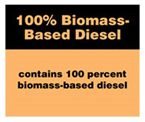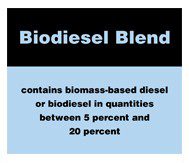 The U.S. Federal Trade Commission has defined biodiesel and biomass-based diesel to clarify their differences. According to the FTC, biomass-based diesel means “a diesel fuel substitute produced from non-petroleum renewable resources that meets the registration requirements for fuels and fuel additives established by the Environmental Protection Agency under 42 U.S.C. 7545, and includes fuel derived from animal wastes, including poultry fats and poultry wastes, and other waste materials, or from municipal solid waste and sludges and oils derived from wastewater and the treatment of wastewater, except that the term does not include biodiesel.”
The U.S. Federal Trade Commission has defined biodiesel and biomass-based diesel to clarify their differences. According to the FTC, biomass-based diesel means “a diesel fuel substitute produced from non-petroleum renewable resources that meets the registration requirements for fuels and fuel additives established by the Environmental Protection Agency under 42 U.S.C. 7545, and includes fuel derived from animal wastes, including poultry fats and poultry wastes, and other waste materials, or from municipal solid waste and sludges and oils derived from wastewater and the treatment of wastewater, except that the term does not include biodiesel.”
In the U.S. EPA’s amended Renewable Fuel Standard (RFS2) finalized in February 2010, biomass-based diesel is defined as “renewable fuel that has lifecycle greenhouse gas emissions that are at least 50 percent less than baseline lifecycle greenhouse gas emissions” and meets all of these requirements: (a) it is a transportation fuel, transportation fuel additive, heating oil, or jet fuel; (b) it meets the definition of either biodiesel or non-ester renewable diesel; and (c) it is registered as a motor vehicle fuel or fuel additive under 40 CFR part 79, if the fuel or fuel additive is intended for use in a motor vehicle. The EPA clarifies that a renewable fuel that is co-processed with petroleum is not biomass-based diesel.
Biodiesel, on the other hand, means “the mono alkyl esters of long chain fatty acids derived from plant or animal matter that meet: the registration requirements for fuels and fuel additives under 40 CFR Part 79; and the requirements of the American Society for Testing and Materials standard D6751–07b (Standard Specification for Biodiesel Fuel Blend Stock (B100) for Middle Distillate Fuels).”
A biodiesel blend is a mix of biodiesel and petroleum-based diesel fuel. Similarly, a biomass-based diesel blend contains biomass-based diesel and diesel.

The FTC assigned label colors for these diesel substitutes – blue for biodiesel and orange for biomass-based diesel. The fuel name is found at the upper portion of the label. Text stating the exact percentage of the diesel substitute is found below the name.
Blends with more than 5% biodiesel or biomass-based diesel needs to be labeled as prescribed by the FTC. Blends with 5% or less biodiesel or biomass-based diesel do not require labels.
Beta Analytic, Inc., of Miami, Florida, is a radiocarbon dating laboratory accredited to the ISO/IEC 17025:2017 standard. The company is promoting the use of ASTM D6866 to verify the accuracy of biofuel blends.
ASTM D6866 can be used to test for the renewable content of the fuel. The method easily determines how much of the blend is biodiesel or biomass-derived diesel by quantifying the carbon 14 present in the samples. The other component of the blend, petroleum-based diesel, has no carbon 14. Thus, the carbon 14 measured via ASTM D6866 can be easily attributed to the percentage of the blended fuel that came from biomass.